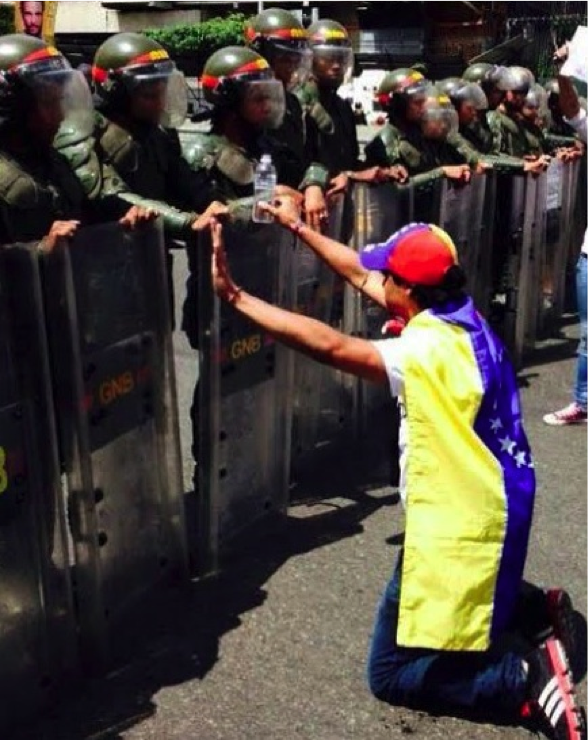
The leader of VenezuelaÔÇÖs opposition party, Leopoldo Lopez, has handed himself in to Venezuelan authorities after giving a speech to opposition protesters in the countryÔÇÖs capital, Caracas.
Venezuela has been thrown into a state of civil unrest as rival parties have held deadly rallies in the capital over the past week. The protests have left at least 4 dead. Three were killed by bullet wounds, two being anti-government and one being pro-government. A final student was run over during a march in the city of Carupano.
The protests originated in western Venezuela in the state of Tachira where several students were arrested.┬á Although they were released the following day, students from Tachira and Merida initiated protests in the region, targeting government buildings. These original protests seemed without aim, as they were hooded and behaving in a manner reminiscent of the London riots. However when asked, the students claimed to be protesting against ÔÇ£insecurityÔÇØ.
These protests have now spread to the capital city of Caracas, where thousands of demonstrators have emerged to protest crime, high inflation and a shortage of basic commodities. One interviewed student from the region said that the country lacked supplies to treat cancer, and had no facilities to provide chemotherapy to sufferers. Furthermore he said that there is a severe shortage of the products that should be available, essentially meaning that ÔÇ£3/10 products which should be on your table are not thereÔÇØ.
The student source has said that there is no national TV coverage of the protests, as the TV network has been censored by the state. He said the only tools which are currently available to students are social media, primarily Facebook and Twitter, which are being used to spread information about marches and developments in the situation.
Despite the good intentions of march organisers, it appears that some of the students have gone beyond the remit of their intentions. After the day time marches, many students have been taking to the streets to wreak havoc, destroying vehicles and attacking buildings and police. Police have reportedly been making use of tear gas, pepper spray and rubber bullets to suppress these more violent activists.
Nicholas Maduro, leader of the United Socialist Party, announced that he would bring Mr Lopez to justice.┬á ÔÇ£He must answer before the prosecution, the courts, the laws his calls to sedition, his unawareness of the constitutionÔÇØ said Maduro, however our source in Venezuela has disputed the claims that protests are banned by the Constitution. Indeed, article 68 of the constitution allows citizens to ÔÇ£demonstrate, peacefully and without weaponsÔÇØ. Although this could work in Leopoldo LopezÔÇÖs favour in highlighting the ÔÇ£unjust justiceÔÇØ which is currently taking place, it could also backfire as many of the protests have included weapons.
As ever with Venezuela, the US has been dragged into the thick of the action amid claims they were directly involved in inciting the movements after meeting with several students. On Sunday, three US diplomats were expelled from the country after these alleged meetings. Naturally the US has outright denied involvement, stating that they are ÔÇ£baseless and falseÔÇØ. However noting the US-Venezuelan past tensions, it is not a stretch of the imagination to imagine that these protests will be highly welcomed in Washington.
With Mr Lopez in custody, it is yet to be seen what ramifications this will have over the coming weeks. However our source has said that this is no longer an issue of rival politicians, but of the national food and commodity shortages, crime and inflation. Until these issues are resolved, they will continue to protest.
Gareth Short





Add Comment